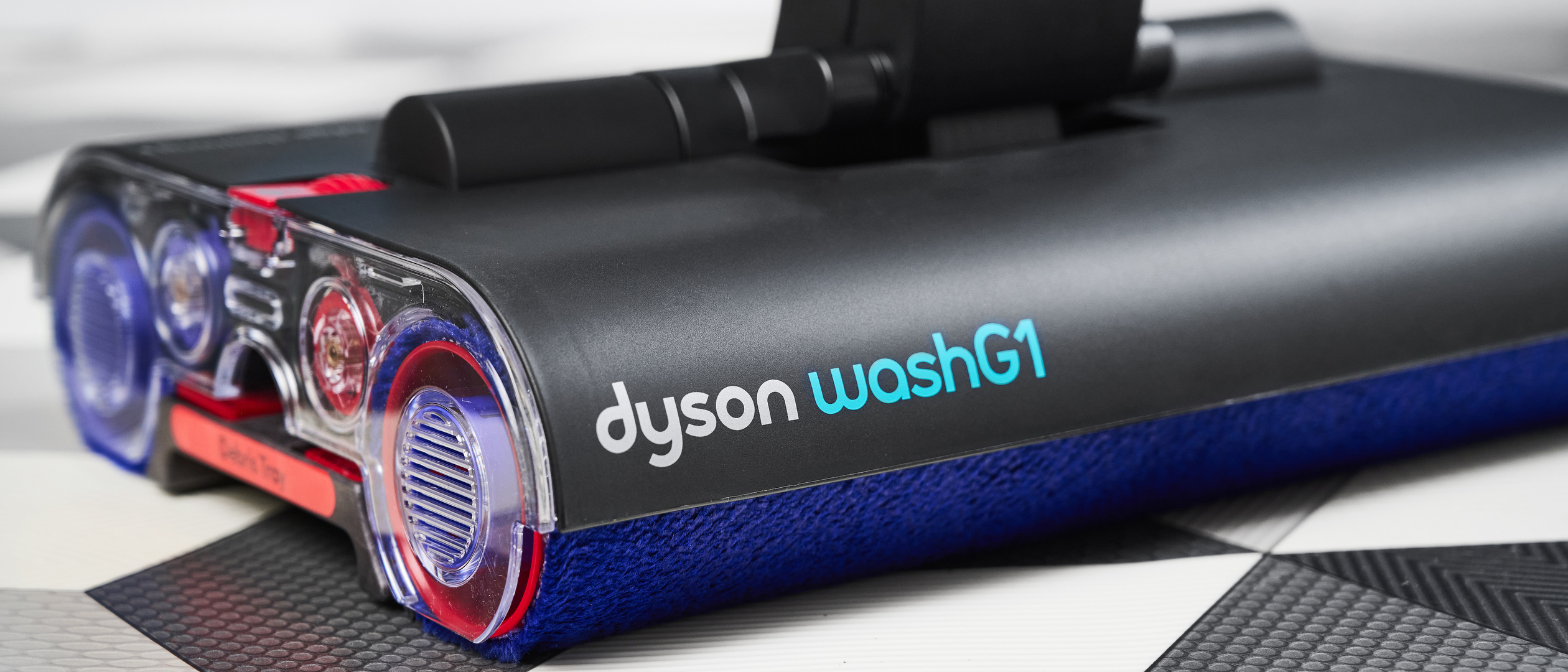TechRadar Verdict
The Dyson WashG1 is a wet cleaner for hard floors. It's streamlined, very easy to maneuver, and fantastic at cleaning perfectly flat floors (although less impressive on slightly uneven ones). On test, I found it effective at tackling all kinds of spillages, including combinations of wet and dry substances (helpful for children's dinnertime messes). The separation of solid and liquid waste certainly makes disposal and maintenance simpler. While it's well-built overall, there are certain design elements that could be improved – for the premium price, I'd expect it to be pretty much perfect.
Pros
- +
Lightweight and very maneuverable
- +
Gets right up to edges of rooms
- +
Tackles wet-dry spillages
- +
Fantastic on perfectly smooth floors
- +
Cleans itself after use
- +
Straightforward disposal of waste
Cons
- -
Struggles with uneven floors
- -
Doesn't scrub or get into grouting
- -
Water tanks fiddly to close
- -
A little overpriced
- -
Not as good as a vacuum for dust
Why you can trust TechRadar
Dyson WashG1: two-minute review
The Dyson WashG1 is this brand's first attempt at a dedicated wet cleaner designed to get your hard floors sparkling clean, using a triple-pronged attack of hydration, agitation, and separation. So: it adds water, uses rollers to rub at the dirt, and then splits wet and dry waste to make disposal easier. As such, it's a little different from most wet-dry cleaners, which suck up wet and dry waste all together into one disgusting soup. (Dyson says that this approach leads to clogged mechanics, tricky maintenance, and machines emitting bad smells when in use.)
I tried one out, and while I was pretty impressed, there's still room for improvement. Like the best Dyson vacuum cleaners, it's extremely maneuverable, with a floorhead that can pivot every which way, and it's cordless too. It's also fairly lightweight, and the dock is pleasingly minimal. On test, cleaned up a variety of spillages with minimal fuss or effort, and effectively separated solid debris from grubby liquid. Because it can deal with spillages that mix solids and liquids, I think it'd be especially helpful for those with children who often create a bit of a mess at dinnertime. (Toddler dumped their whole cereal bowl on the floor? No worries, the WashG1 can handle all of that with a few backward and forward passes.)
What are the downsides? While it's fantastic on perfectly flat floors (lino, polished concrete) it can't really cope with uneven flooring and won't dig into the grouting spaces between tiles, for instance. I has issues with some design elements – the water tanks can be fiddly to close properly and occasionally leaked, and I felt the screen could be used to provide more useful info.
Many of these niggles could be forgiven, but not at this price point, which is predictably high. And there are limits to how well it can handle hair and dust, which means you probably won't be a replacement for your vacuum cleaner, either. That's the short version; read on for my full Dyson WashG1 review.
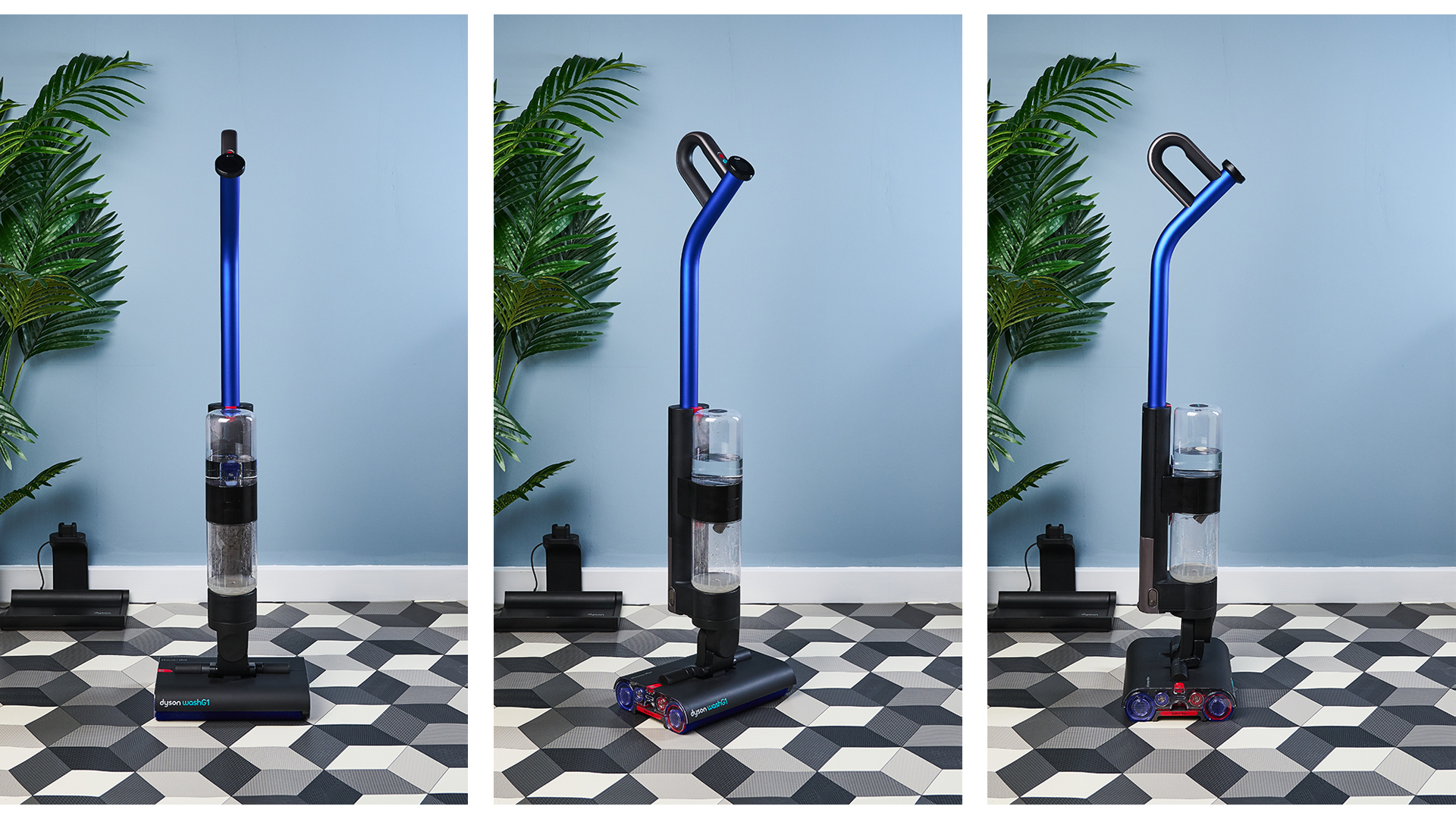
Dyson WashG1 review: price & availability
- Launched: Announced May 2024, on sale August 2024
- Price: $699.99/ £599.99 / AU$999
- Available: Now in US, UK and AU
The Dyson WashG1 was announced in May 2024 and went on sale in late summer 2024 in the UK and Australia, and early October in the US. Direct from Dyson it has a list price of $699.99 in the US, £599.99 in the UK and AU$999 in Australia. You can also pick it up at a handful of third party retailers in each country, although not Amazon.
As is typically the case with Dyson, this is premium product. I don't have as much of an issue with Dyson's prices as many people seem to, but I am questioning whether this particular release is a bit overpriced. It works pretty well, but usually with these ultra-pricey products there's a bit of super-cool-but-not-strictly-necessary tech thrown in (the Gen5detect's real-time dust particle reports, or the Supersonic Nural's head-sensing temperature adjustment, for example), whereas the WashG1 has very little in the way of flashy features. I also have a few design niggles, and I'd expect things to be pretty perfect at this price.
There are plenty of (different) alternatives that cost less. For hard floors specifically, there are plenty of steam cleaners on the market. Many of today's best robot vacuums have a good mop function, and while prices vary hugely, they have the benefit of being able to deal with carpet as well, which the WashG1 cannot. If you also have carpet, within Dyson's own range, you'd be better with the Dyson V15s Detect Submarine, which is essentially a vacuum with a wet cleaning floorhead that can be swapped on. See exactly what the differences are in our Dyson V15s Detect vs WashG1 comparison.
- Value for money score: 3 out of 5
Dyson WashG1 specs
| WashG1 size (H x L x W): | 114 x 22.5 x 30cm |
| Dock size (H x L x W): | 24 x 24 x 30cm |
| Weight (empty): | 10.8 lbs / 4.9kg |
| Clean water tank volume: | 1L |
| Dirty water tank volume: | 0.8L |
| Max runtime: | 35 mins |
| Cable length: | 1.2m |
Dyson WashG1 review: design
- Very maneuverable, streamlined design and minimal dock
- Separates wet and dry debris for easier disposal
- Easy to clean, but some moving parts are fiddly
If you're imagining a bulky, unwieldy cleaner, you don't need to worry. The WashG1 is streamlined and very easy to maneuver.
Let's start at the bottom. Here, you'll find the cleaner head, which is about the size of an A4 piece of paper, but thicker (of course), and pivots any way you want it to. Underneath are two microfiber rollers for wet spills, with a plate that presses into them to squeeze out dirty water. These use high-density microfiber, designed to be super-absorbent and grippy. There are also secondary rollers with big nylon bristles, designed to tackle debris and hair.
The rollers can be removed for deep cleaning as required. They're also replaceable. Exactly how often they need replacing depends on how much you're using the product, but Dyson estimates it at a minimum of six months.
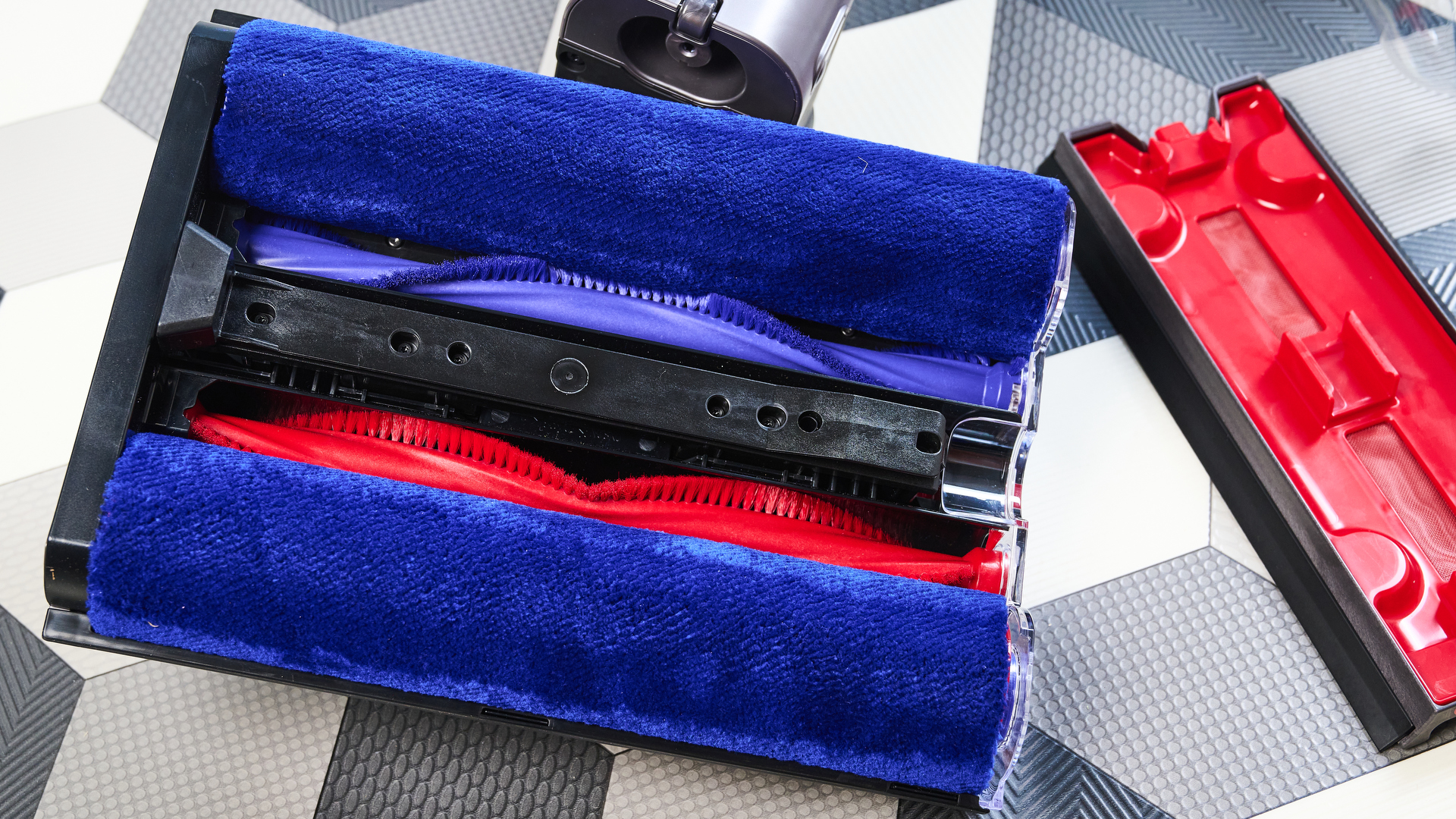
A mesh inside the floorhead siphons off the solid waste and channels it into a dry waste tray that sits in the base of the floorhead. The idea is that you slide out the tray and tap the waste into the trash, before dealing with the liquid separately. In use, I found this tray sometimes got stuck, and could also be tricky to line up and get back into the floorhead. Once out, it's easy to remove the debris and rinse it out, though.
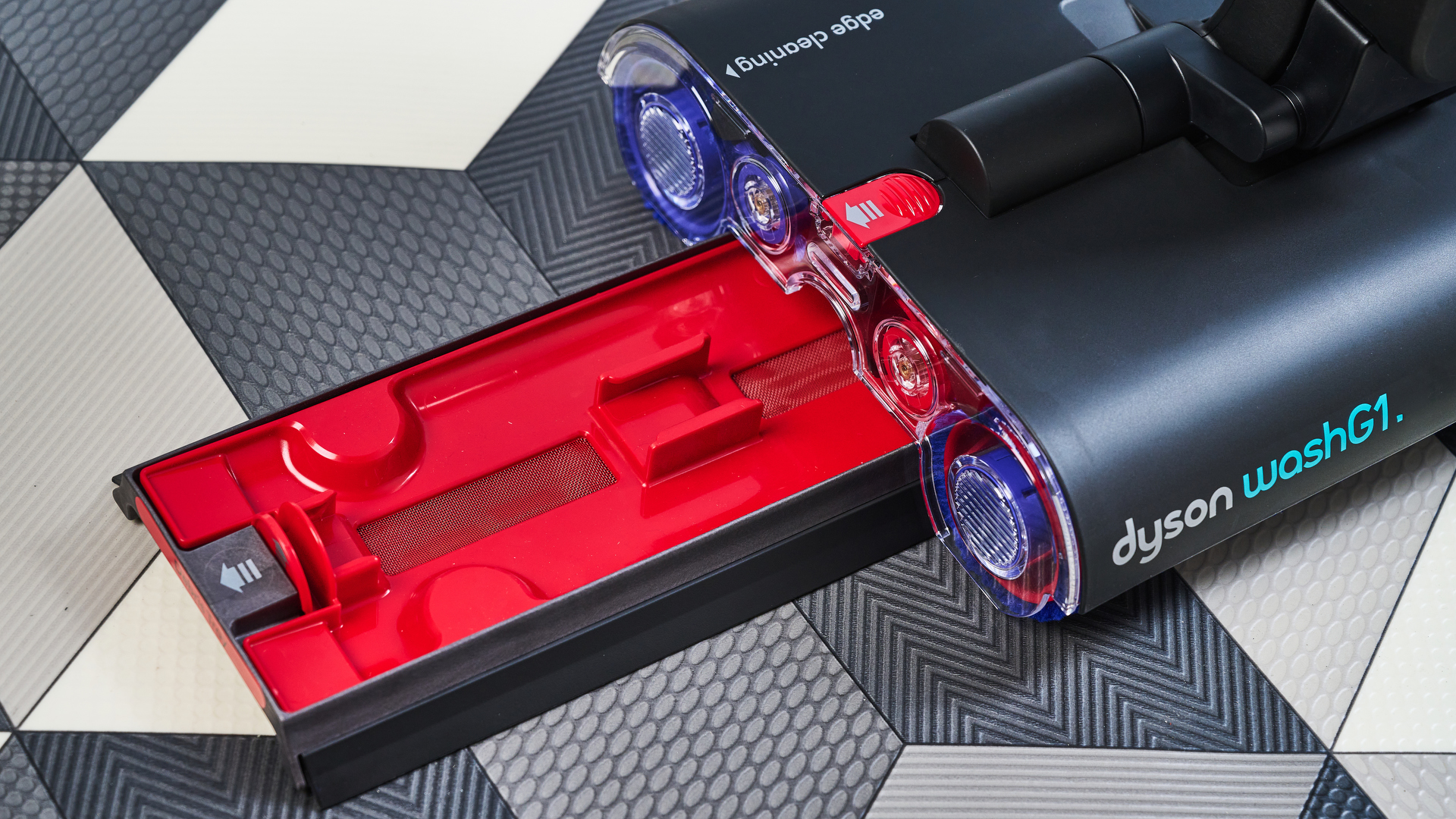
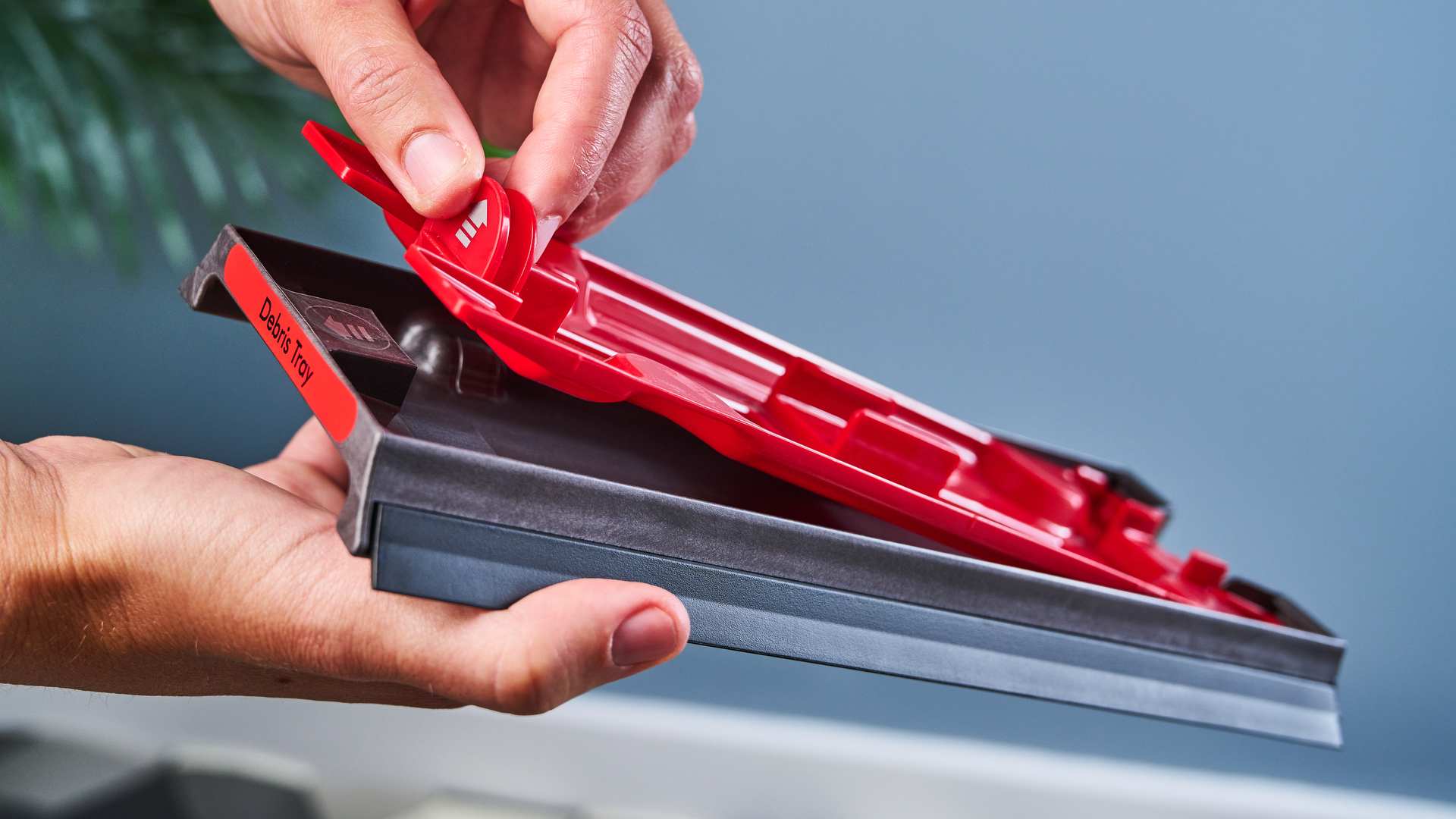
Clipped to the handle are the two water tanks – one for clean water and the other for dirty. Each holds around a liter of water. The WashG1 is designed to be used with just water, although you could add a floor cleaner liquid if you wanted.
The tanks clip on and off the handle, and each is individually sealed with a screw top, theoretically to prevent spillages. In reality, the lids of the water tanks need to be precisely lined up, and they don't screw on very deeply, both of which means they aren't as secure as I'd like them to be. I also found dirty water sometimes leaked out of the inlet when I took it off to empty it. Again, they are easy to clean though – there are no sharp corners where grime can build up, and they're large enough that you can easily get your whole hand in there.
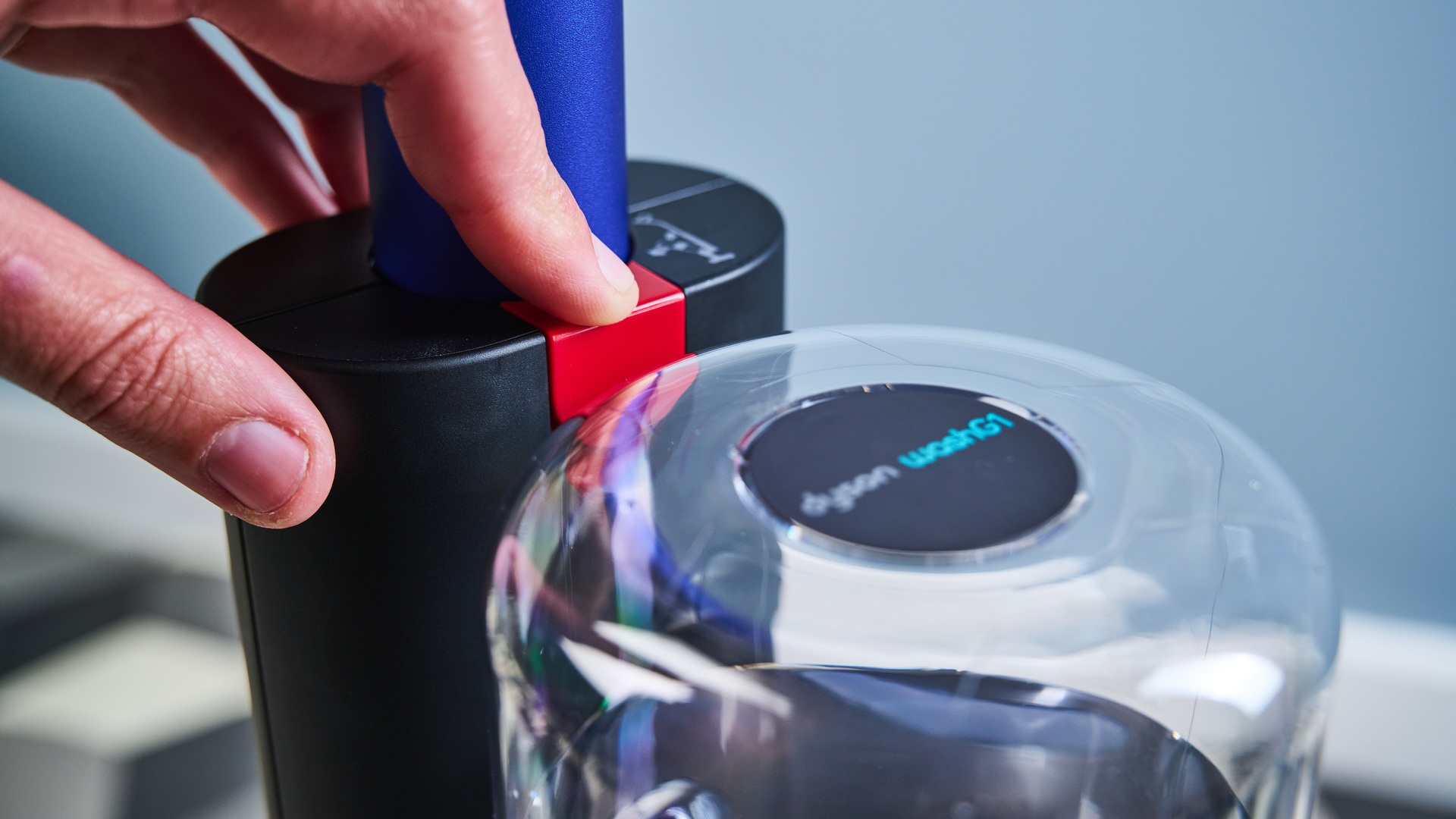
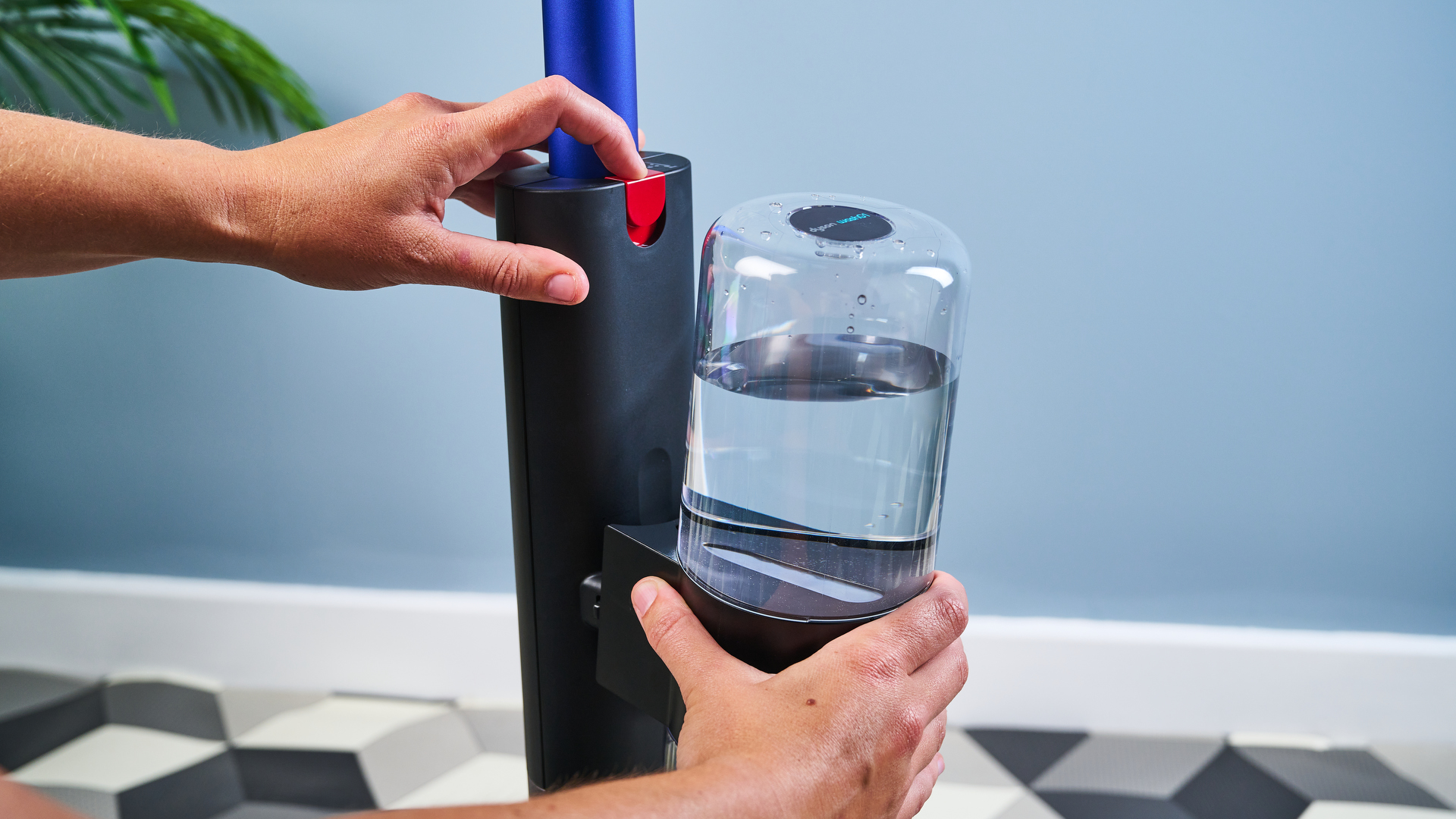
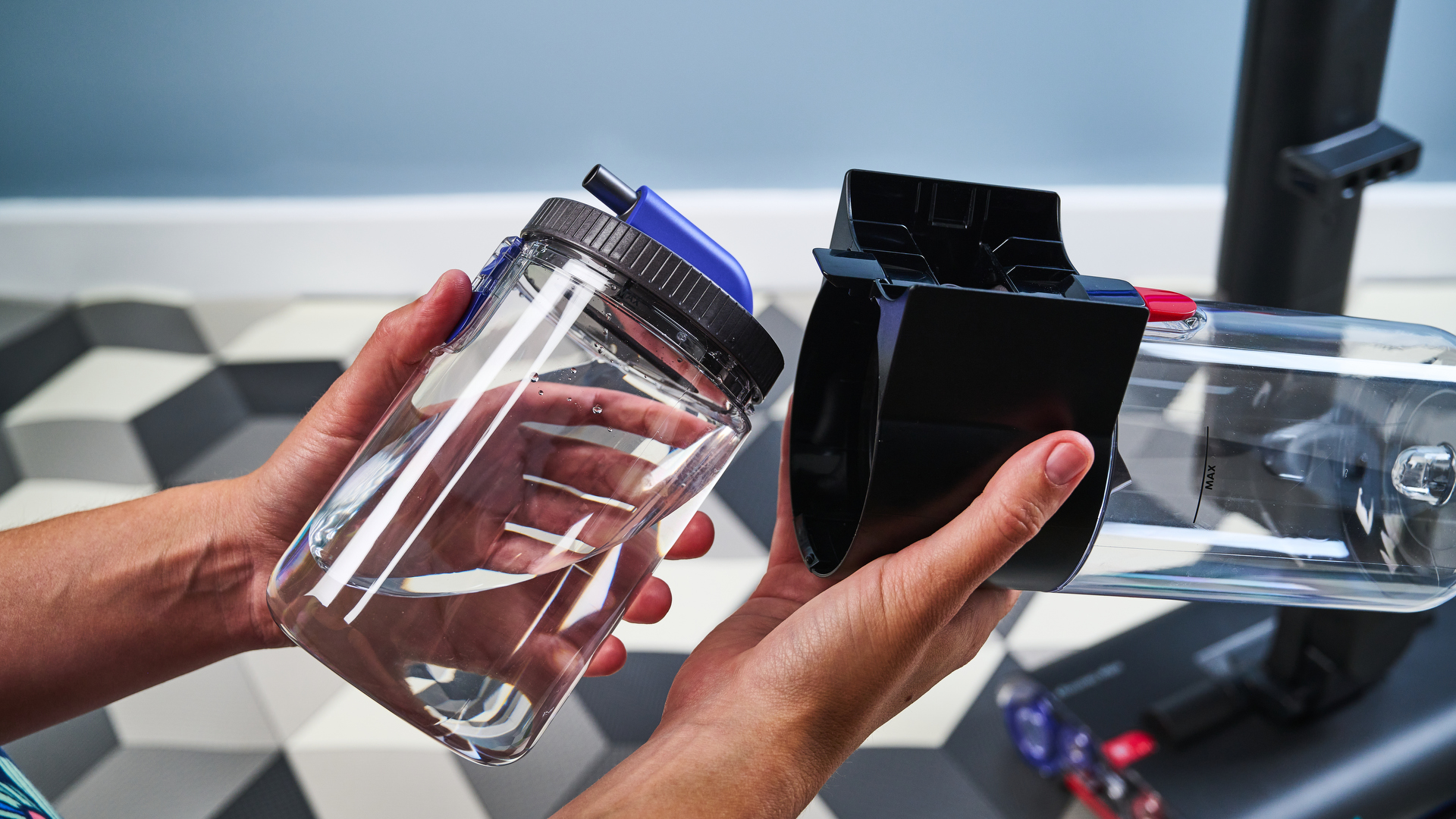
The dock is very minimal. It's only marginally bigger than the cleaner head itself and very lightweight. One minor complaint is that the power cable is loose/wobbly when plugged in. I thought this might have just been a one-off, but it's an issue that's flagged in multiple reviews.
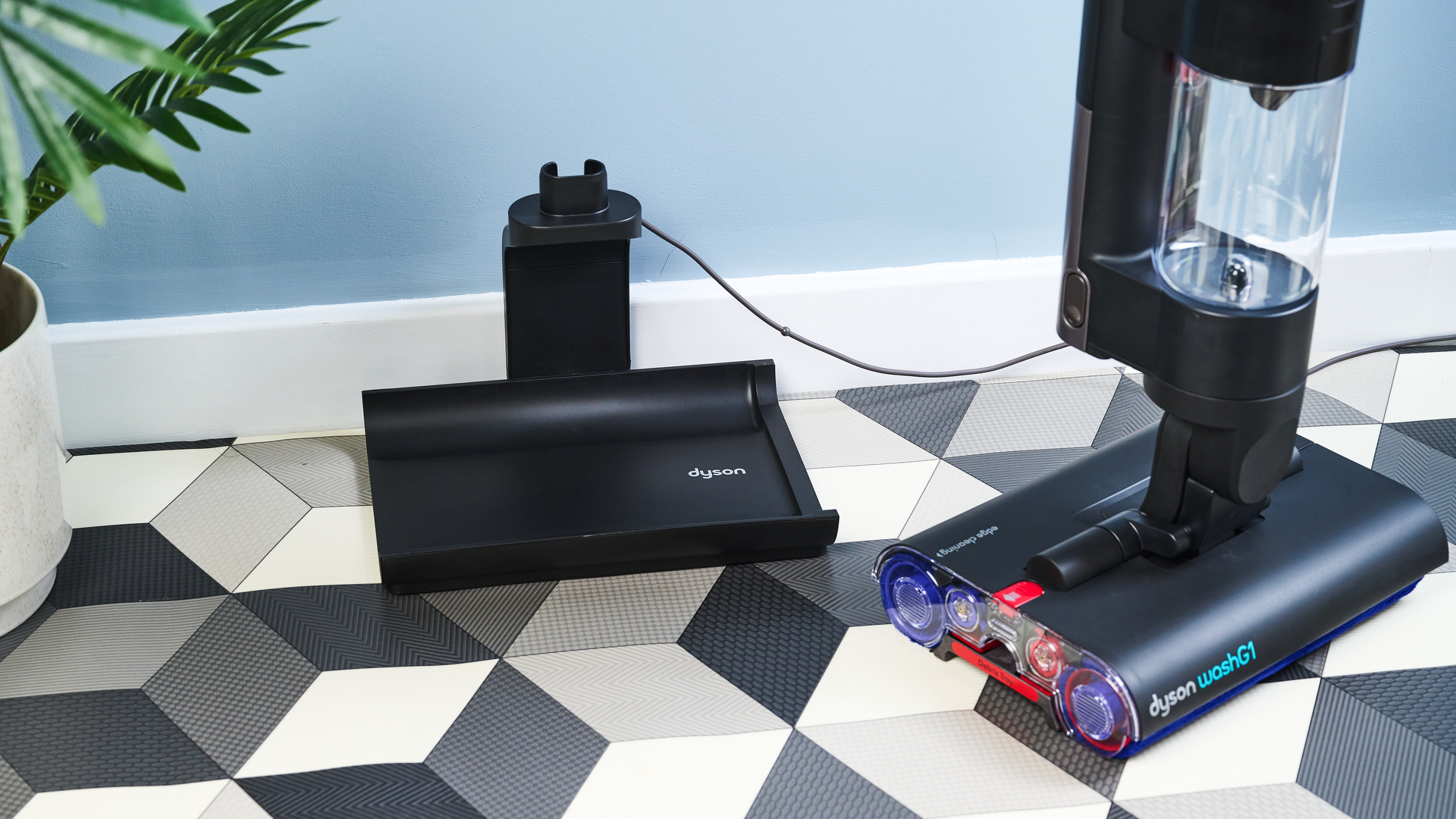
The WashG1 has three different hydration modes, as well as a no-water mode and a Max mode, which adds even more water and is designed for ingrained dirt. You manually select the mode you want based on the type of flooring and how dirty it is, using the silver button on the handle. Max mode is unleashed by holding down a separate button with water droplets on it.
There's also a self-clean mode. This takes two minutes and can be activated when the WashG1 is on its dock. It runs clean water through the mechanism and over the rollers, uses a brush bar to remove any lingering solid debris from the rollers, and then does a no-water run to dry everything off a bit. It's designed for everyday maintenance after each use but must be supplemented with periodic deep cleaning (this is normal for wet cleaners).
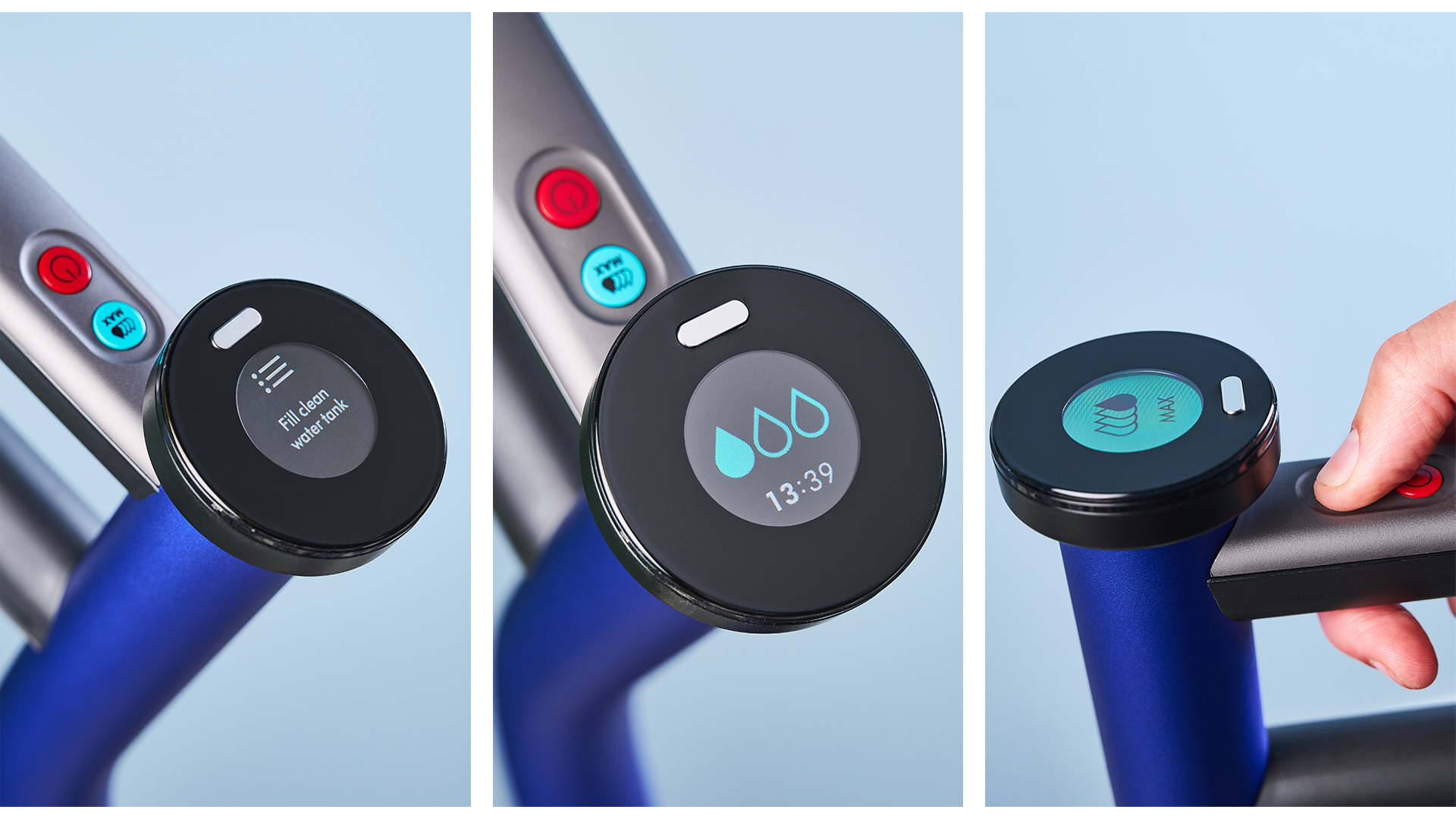
Dyson is in the habit of adding little screens to all of its products, and the WashG1 is no exception. Here it's used to show you which hydration mode you're using, and (usefully) provide a to-the-minute countdown of how much battery life you have left. It'll also provide graphics telling you to do things – so prior to each self-clean it'll display a graphic showing to to empty the tanks, clear the tray etc., for example.
It will also inform you of when your dirty water tank is full and needs emptying and when the floorhead rollers need replacing. However, that's where the troubleshooting info ends. Occasionally while testing, my WashG1 would refuse to start cleaning, and I wasn't sure what was wrong. Once, it was that the clean water tank was empty, and once I think it was because the debris tray wasn't slotted in properly. Neither of those things are particularly tricky to check manually, but Dyson's vacuums in this price band do provide specific troubleshooting information, and it would be equally helpful here.
(A quick side note on the app. Before I could use the WashG1, I was prompted to download the Dyson app. With other Dyson products, this provides things like stats for cleaning patterns or other usage data, but there's none of that with the WashG1. Here, it's mainly a home for videos explaining how to use the product, and is largely unnecessary.)
- Design score: 3.5 out of 5
Dyson WashG1 review: performance
- 3 hydration modes, plus a boost mode and a self-clean cycle
- Great on flat floors / lino, but struggles with uneven flagstones
- Tackles different spillages effectively, but not as good as a vacuum for dust
I tried out the WashG1 on a flagstone floor, a lino floor and a polished concrete floor. During my review period, I started out by using it for general cleaning as well as running specific tests on different types of spillages, including coffee grounds, puffed rice cereal, dried-on honey and Marmite (in the interests of making this internationally-friendly, that's a thick, sticky yeast extract spread. It's delicious. Honestly).
Overall, I found it very comfortable to use. It feels fairly lightweight and, as I'd expect from Dyson, is very easy to maneuver. The cleaner head pivots fully so you can navigate easily around chair legs and under furniture. When switched on, you can feel it gently trying to propel itself forwards. The rollers run right up to the edges of the cleaner head, which means you can get nice and close to the baseboards and edges of cabinets. However, it can get stuck on high thresholds, and need picking up and lifting over.
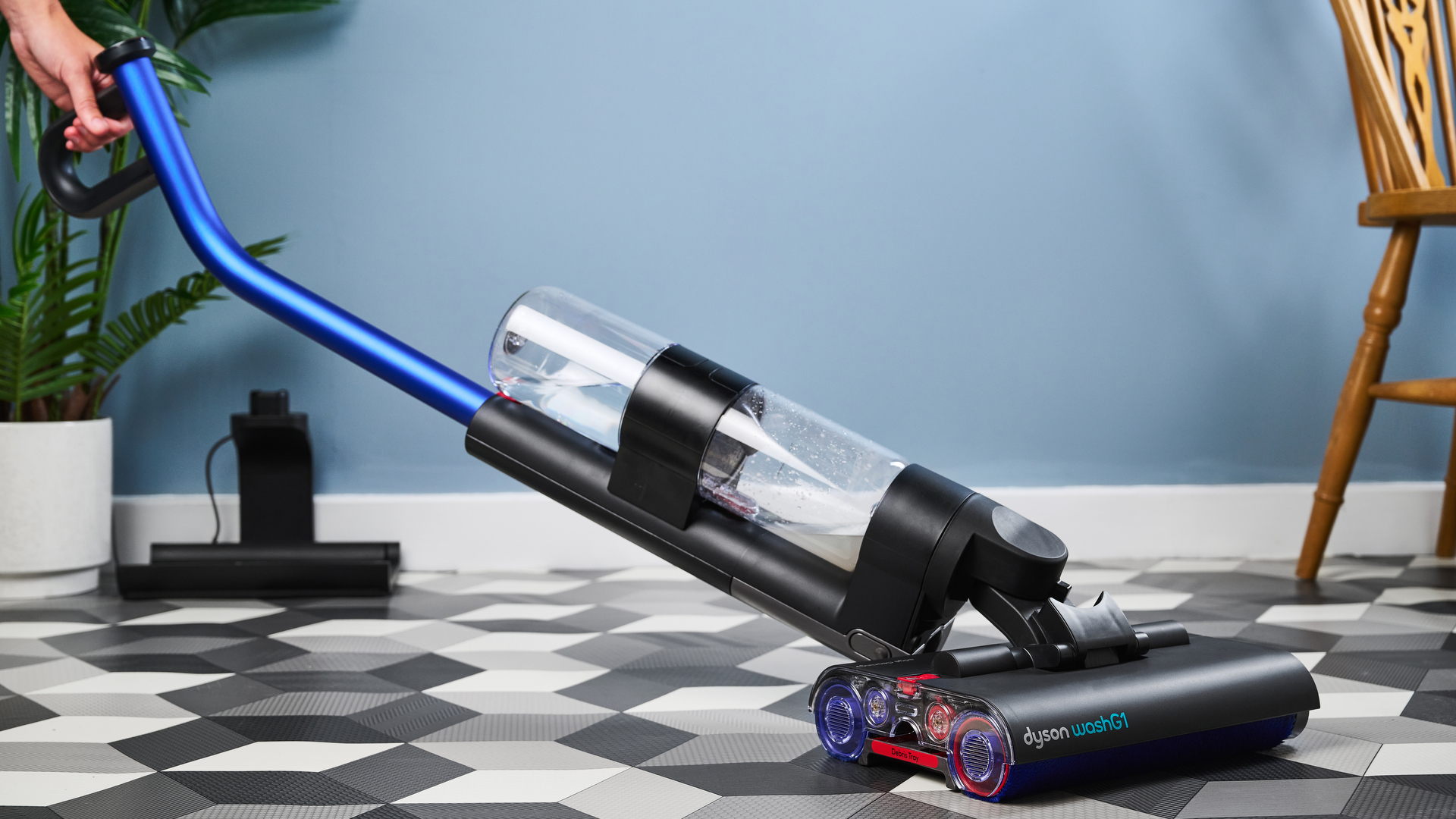
In use, the grubby water trickling into the clear waste tank is a satisfyingly disgusting visual cue that it's doing its job (and can be a bit of a shock if, prior to cleaning, you thought the floor looked pretty clean). The WashG1 isn't especially aggressive in its agitation – during the initial press briefing for the WashG1, the engineers explained that they found the best way to tackle ingrained spillages was by adding more water, rather than rubbing harder.
Perhaps because it doesn't really 'scrub' or maybe just due to the design in general, it's much better on flat surfaces than uneven ones. It worked fantastically well on lino and polished concrete, cleaning everything evenly and thoroughly. In contrast, it struggled with my slightly uneven flagstone floor, missing patches and dragging debris into the wide grouting spaces, where it would remain indefinitely if I hadn't gone in with a cloth.
Using the medium hydration mode, the floor was left damp but not sopping, and dried within maybe 10 minutes. I tried the lightest hydration mode on a hardwood floor, and it left only a light sheen of water (which is all I'd want).
The battery life is pretty good at 35 minutes. The battery is removable, so presumably you could buy a spare and double that, if you needed. It's not as long as your average cordless stick vac, but it is long enough to do a good amount of cleaning. The motor will automatically cut out when the handle is clicked upright, to preserve battery. In terms of noise levels, I'd it's say quieter than your average vacuum cleaner, and a little noisier on the auto-clean cycle.
Now onto the specific cleaning tests. First up, wet spillages – these disappeared completely with a single pass with the WashG1.
The WashG1 picked up coffee grounds on the medium mode on the first pass, although did drag some of them into grouting cracks, where they stubbornly remained, no matter how many back-and-forth passes I did. Eventually, they had to be cleaned with a cloth.
The sticky Marmite, which I'd left to dry for a few hours, loosened with a few passes, and disappeared when I unleashed Max hydration mode. It was similar situation with the honey. A few passes were needed to ensure no stickiness remained.
Although in reality, you'd perhaps just use a dustpan and brush for dry spillages, I wanted to see if the WashG1 could handle them too, so tested it out on some dry cereal. I was pretty impressed. There was minimal pinging about, and most got pulled up in one pass. Again, the uneven floor proved a hindrance, and some Krispies got stuck in the kracks. There was also clearly some debris stuck on the rollers, because bits that had been pulled up on a previous pass sometimes made a reappearance on a later one.
(I suspect that all of these cleaning tasks would have been completed more efficiently on a perfectly flat, lino floor, but where is the challenge there?).
While I had no complaints with the WasG1's cleaning performance, I suspect I would get similar results on most spillage types with a decent steam cleaner. Where it does stand out is with its ability to handle wet-dry spillages (so, say, you dropped your whole bowl of cereal, with milk, on the floor) that you'd otherwise have to get a cloth out for. People with messy eater children might be particularly keen on this appliance.
Could you replace your vacuum cleaner with the WashG1? Probably not. If your floor has any kind of texture, a vacuum will pull up dust and hair far more effectively than the WashG1, and you'll need the detail tools for getting into any cracks and crevices too. However, I should note that I tested the WashG1 on the polished concrete floor after a full-family home haircut session, and it did an excellent job of grabbing all the tiny pieces of hair from that perfectly flat, smooth floor.
- Performance score: 4 out of 5
Should I buy the Dyson WashG1?
| Attribute | Notes | Rating |
|---|---|---|
| Price | Premium, but doesn't quite justifies the price at present. Lots of more affordable alternative cleaners. | 3/5 |
| Design | Innovative wet/dry separation, but some usability elements could be improved. | 3.5/5 |
| Performance | Very maneuverable, gets close to edges. Very effective on hard, flat floors but not so good on uneven floors. | 4/5 |
Buy it if...
You have mostly flat, hard floors in your home
Where the WashG1 really excels is at cleaning completely flat floors, including things like lino and polished concrete. On test, it tackled all kinds of spillages and messes very effectively.
You have messy eaters in the house
The WashG1 can handle wet-dry spillage that you'd otherwise have to get a cloth out for. I suspect it would be a great benefit for people whose children have a habit of flinging food on the floor at mealtimes.
You need to maneuver into tight spaces
Like all of Dyson's floor cleaner products, the WashG1 is super-maneuverable, with a floorhead that can pivot every which way, around obstacles. It's also streamlined and relatively lightweight for a wet floor cleaner.
Don't buy it if...
You're on a budget
It's premium, and there are plenty more affordable options on the market that are great at cleaning hard floors.
You want an all-in-one solution
The WashG1 is for hard floors only. If you also need something for carpet, the Dyson Submarine is a better choice, or you might want to opt for a robovac with mopping capabilities.
How I tested the Dyson WashG1
- I tried it out on a lino floor and on a flagstone floor
- I ran a series of tests using wet and dry spillages of different kinds
I tested the Dyson WashG1 on a lino floor, flagstone floor and polished concrete floor. As well as just general cleaning use, I ran a series of tests to see how well it coped with different kinds of spillages. These included wet-dry spills (coffee grounds), sticky spills (honey) and chunky, dry spillages (cereal). I also tested how well it could tackle hair by using it to clean up after a family home haircut session. I compared the performance, price and specs with other wet cleaners on the market.
Read more about how we test
First full review: September 2024
Hands on: May 2024

Ruth is TechRadar's Homes Editor specializing in air (vacuum cleaners, fans, air purifiers), and hair (hair dryers, straighteners and stylers). She has been in consumer journalism since 2020, reviewing and writing about everything from outdoor kit to mattresses and wellness gadgets, with stints on Tom's Guide and T3.
